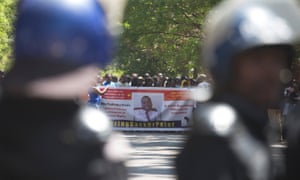Source: Police stop union leader from leaving Zimbabwe for treatment | World news | The Guardian
Dr Peter Magombeyi was due to fly to South Africa after being injured in suspected abduction

Riot police have been deployed in Harare to stop a doctor, who was reportedly abducted last week by suspected state security services, from leaving Zimbabwe to seek medical attention in South Africa.
Dr Peter Magombeyi, the president of the Zimbabwe Hospital Doctors Association, was held in an unknown location for five days last week before being discovered on the side of a road, disoriented and injured.
He had been due to take an evening flight to neighbouring South Africa to receive emergency treatment for suspected liver damage and his lawyers had earlier obtained a high court order to allow travel.
Late on Tuesday, dozens of police arrived at the clinic where Magombeyi has been cared for since his abduction. Witnesses said the police were led by an unidentified man in civilian dress who told Magombeyi he would not be allowed to leave the building.
Human rights campaigners said authorities fear examination by doctors in South Africa will reveal evidence that Magombeyi was tortured, and expressed concern that police were apparently ignoring the instructions of a judge.
Dozens of pro-democracy campaigners, trade unionists and opposition officials have been abducted by suspected state security services since contested elections last year. Most have been released after several hours, though many have been badly beaten, stripped, threatened or otherwise mistreated.
Government ministers and senior officials suggested the apparent abduction of Magombeyi was carried out by a “third force” to destabilise the country.
Nick Mangwana, the information secretary, described Magombeyi as a “liar” after his release.
The latest incident in Harare comes as Harvard University faces pressure to rescind a title of “honorary ambassador” given to Auxillia Mnangagwa, the wife of Zimbabwe’s president, Emmerson Mnangagwa, for “exemplary work” in the field of public health.
In a release last week, the Global Health Catalyst programme, which fights cancer and other diseases through outreach, collaboration and high-profile international initiatives, announced it was honouring the Zimbabwean first lady for her work in increasing access to cancer prevention and control and would organise a major conference in the former British colony.
Zimbabwe’s first lady founded a charity last year dedicated to public health work. Its website says it is “a foundation built of the strong African traditional and Christian values of love and unity.”
Some media outlets in Zimbabwe reported the award would lead to investment in Zimbabwe’s health sector and had been prompted by cancer-screening programmes that had benefited thousands of women.
However the university’s decision has surprised some observers.
In addition to a poor human rights record and allegations of electoral malpractice, Zimbabwe’s public health service is suffering an acute lack of investment while an economic crisis, blamed by many analysts on the policies of the ruling Zanu-PF party, has led to acute medicine shortages.
Members of the political elite are routinely treated overseas.
Magombeyi was leading thousands of doctors who have been on strike for better conditions and pay when he was abducted. Soaring inflation in recent months has devalued salaries that were already barely adequate.
In a letter addressed to the director of global health catalyst at Harvard medical school, Prof Wilfred Ngwa and more than a dozen former US diplomats, including several former ambassadors to Zimbabwe, have expressed their “profound concern over [the] decision to honour the first lady of Zimbabwe”.
They wrote: “To be blunt, your well-intentioned work in these areas are tainted by the affiliation with Ms Mnangagwa and her direct personal connection to an increasingly corrupt and abusive administration in which tolerance for dissent is non-existent and democratic rights are violently denied.
“In light of the concerning situation in Zimbabwe, we implore your institution to … consider rescinding this honour to first lady Mnangagwa … Too often, repressive regimes will use prestigious international institutions, like Harvard University, to launder their oppressive practices and reputations.”
Mnangagwa took power in 2017 when the veteran ruler Robert Mugabe was forced to resign after a military takeover in November 2017. He promised to bring foreign investment to avert a deepening economic crisis, overhaul government and rehabilitate the former British colony’s international image.
Zimbabwe is crippled by massive debts incurred during Mugabe’s rule and needs a multibillion-dollar bailout to prevent economic collapse. However, the continuing repression and a lack of tangible political reform means there is little chance of international institutions offering major aid packages.
COMMENTS
Patently obvious that the police have something that needs to be hidden from public view.